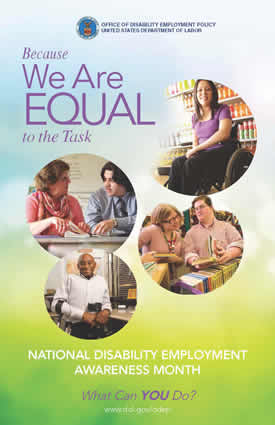by: Susan Olivo and Elaine Katz

Each October, in recognition of National Disability Employment Awareness Month, our nation honors the invaluable contributions of Americans with disabilities to our nation’s workforce. These friends and colleagues overcome adversity on a daily basis to help drive our economy forward.
It is also a time to ask ourselves what we all can do to help break down the barriers between individuals with disabilities and the jobs for which they are qualified. To help prevent discrimination against those with disabilities, and help support a diverse workforce, philanthropy should take the lead in ensuring equal employment opportunities for all.
An estimated 58 million Americans have at least one disability, making them the largest minority group in the nation. As baby boomers age, and service members transition back to civilian life, experts estimate that number could double within 20 years. Nevertheless, less than 3 percent of philanthropic giving is directed to programs serving people with disabilities.
Even after 23 years of the Americans with Disabilities Act being signed into law, achieving equality of opportunity, with full inclusion in the workplace remains elusive for the 58 million Americans facing physical, social or emotional challenges.
Youth with disabilities face significant challenges in school and in the transition to adult life. National studies show that compared to their non-disabled peers, students with disabilities are less likely to receive a regular high school diploma, drop out twice as often, and enroll in and complete post-secondary education programs much later after leaving high school and at just half the rate.
Having a disability can mean exclusion from a labor market due to prejudice and fear. Ironically, finding and keeping good workers are among the greatest challenges facing businesses in the 21st century.
Philanthropic dollars support efforts to alleviate poverty and increase jobs through workforce investment. Yet many program officers fail to realize the large participation of people with disabilities in their programs. Looking at our funding efforts through a wider, more inclusionary lens, enables us to make adjustments to programs to ensure accessibility by people with disabilities.
And by supporting advocacy efforts on a national scale to help foster acceptance and reduce discrimination, we send the message that accessibility should be the norm, not an afterthought.
Take the example of My Blind Spot, a small, grassroots organization that has been working to provide a solution to the lack of access to mainstream accounting software for blind entrepreneurs and financial management professionals. The need to ensure independent access and employment opportunities for the blind community motivated them to reach out to Intuit, producer of QuickBooks, the premier small business accounting software, which had not consistently interfaced with adaptive and assistive technologies used by the blind. Through a collaborative effort, the small non-profit helped Intuit focus on the need for improving the accessibility and usability of QuickBooks. Working with input from the blind community, the Intuit engineers are designing an ADA-compliant QuickBooks for Windows that should launch in early 2014.
By providing financial resources to help organizations like My Blind Spot address the critical issues that impact employment and quality of life for individuals with disabilities, philanthropy can lead the charge to create a higher quality of life through the advancement of educational, rehabilitative and technological initiatives.
When it comes to breaking down barriers in the workforce for those with disabilities, philanthropic leaders can help shift perspectives, so that people with disabilities are included in employment initiatives from the beginning. And as we recognize National Disability Employment Awareness Month, we should redouble our commitment to promoting the development and dissemination of tools and technologies that help those with disabilities gain the skills, competence, and assurance they need to compete on the job.
Susan Olivo is the Executive Director of Reader’s Digest Partners for Sight Foundation. Elaine Katz is the Vice President of Grants and Special Initiatives at the Kessler Foundation. Both serve on the board of the Disability Funders Network.
Tags: action, disability